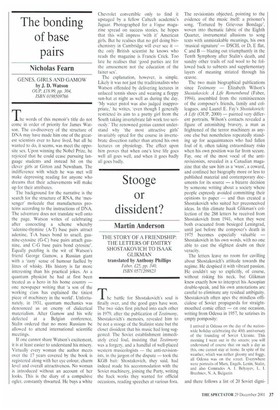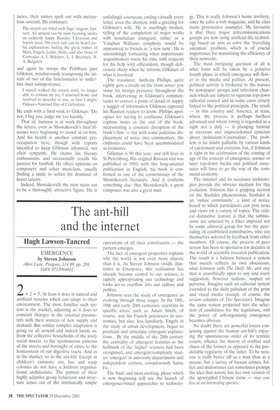Stooge or dissident?
Martin Anderson
THE STORY OF A FRIENDSHIP: THE LETTERS OF DMITRY SHOSTAKOVICH TO ISAAK GLIKMAN translated by Anthony Phillips Faber, 125, pp. 340, ISBN 0571209823 The battle for Shostakovich's soul is finally over, and the good guys have won. The two sides first pitched into each other in 1979, after the publication of Testimony, Shostakovich's memoirs, revealed him to be not a stooge of the Stalinist state but the closet dissident that his music had long suggested. The Soviet establishment immediately cried foul, insisting that Testimony was a forgery, and a handful of well-placed western musicologists — the anti-revisionists, in the jargon of the dispute — took the KGB bait: Shostakovich, they said, had indeed made his accommodation with the Soviet machinery, joining the Party, writing the hack works they wanted for official occasions, reading speeches at various fora.
The revisionists objected, pointing to the evidence of the music itself: a prisoner's song, 'Tortured by Grievous Bondage', woven into thematic fabric of the Eighth Quartet, instrumental allusions to song texts with unmistakable meanings, his own 'musical signature' — DSCH, or D, E flat, C and B — blazing out triumphantly in the Tenth Symphony after Stalin's death, and sundry other trails of red wool to be followed back to subtexts and supplementary layers of meaning striated through his oeuvre.
The two main biographical publications since Testimony — Elizabeth Wilson's Shostakovich: A Life Remembered (Faber, 1994), assembled from the reminiscences of the composer's friends, family and colleagues. and Laurel E. Fay's Shostakovich: A Life (OUP. 2000) — painted very different portraits. Wilson's contacts revealed a figure of astonishing bravery, a man as frightened of the terror machinery as anyone else but nonetheless repeatedly standing up for acquaintances who had fallen foul of it, often taking extraordinary risks when his own position was far from secure. Fay, one of the most vocal of the antirevisionists, revealed in a Canadian magazine that she saw him as a 'miss', a coward, and confined her biography more or less to published material and contemporary documents for its source — a bizarre decision by someone writing about a society where people expressly avoided committing their opinions to paper — and thus created a Shostakovich who suited her preconceived ideas. In this climate Isaak Glikman's collection of the 288 letters he received from Shostakovich from 1941, when they were both evacuated from besieged Leningrad, until just before the composer's death in 1975 becomes especially valuable — Shostakovich in his own words, with no one able to cast the slightest doubt on their veracity.
The letters leave no room for cavilling about Shostakovich's attitude towards the regime. He despised it with vibrant passion. He couldn't say so explicitly, of course, without risking his neck, but Gilman knew exactly how to interpret his Aesopian double-speak, and his own annotations are careful to eliminate any residual ambiguity. Shostakovich often apes the mindless officialese of Soviet propaganda for straightmouthed comic effect — on one occasion, writing from Odessa in 1957, he satirises its empty pomposity:
I arrived in Odessa on the day of the nationwide holiday celebrating the 40th anniversary of the founding of Soviet Ukraine, This morning I went out in the streets; you will understand of course that on such a day as this, one cannot stay at home. In spite of the weather, which was rather gloomy and foggy, all Odessa was on the street. Everywhere were portraits of Marx, Engels, Lenin, Stalin, and also Comrades A. I. Belyayev, L. I. Brezhnev, N. A. Bulganin
and there follows a list of 20 Soviet digni taries, their names spelt out with meticulous sarcasm. He continues:
The streets are filled with flags, slogans, banners. Al] around can be seen beaming smiles on radiantly happy Russian. Ukrainian and Jewish faces. On every side can be heard joyful explanations hailing the great names of Marx, Engels, Lenin, Stalin, and also those of Comrades A. I. Belyayev, L. I. Brezhnev, N. A. Bulganin
and again he troops the Politburo past Glikman, mischievously transposing the initials of two of the functionaries to underline their unimportance.
I myself walked the streets until, no longer able to contain my joy, I returned home and resolved to describe to you, as best I might, Odessa's National Day of Celebration.
He ends with a final wink to Glikman: 'Do not, I beg you, judge me too harshly.'
That sly humour is at work throughout the letters, even as Shostakovich's final illnesses were beginning to crowd in on him. And his health is another constant preoccupation here, though with reports intended to keep Glikman informed, not elicit sympathy. He shares his literary enthusiasms, and occasionally recalls his passion for football. He offers opinions on composers and other musicians, usually finding a smile to soften his dismissal of lesser talents.
Indeed, Shostakovich the man turns out to be a thoroughly attractive figure. He is unfailingly courteous, ending virtually every letter, even the shortest, with a greeting for Glikman's wife. He is startlingly modest, telling of the completion of major works with nonchalant disregard, rather as a Vaughan Williams symphony would be announced to friends as 'a new tune'. He is astonishingly forbearing when importunate acquaintances waste his time with requests for his help with officialdom, though deliciously sharp when he informs Glikman of what is involved.
The translator, Anthony Phillips, quite rightly gets a credit on the front cover: you sense his benign presence throughout the book, intervening in Glikman's commentaries to correct a point of detail or supply a nugget of information Glikman expected his Russian readers to know. Phillips apologises for having to confiscate Glikman's copious notes to the end of the book, necessitating a constant disruption of the book's flow — but with some judicious displacement of notes into commentary, the endnotes could have been accommodated as footnotes.
Glikman is 90 this year, and still lives in St Petersburg. His original Russian text was published in 1993; with this long-awaited publication in English, his book is confirmed as one of the cornerstones of the Shostakovich literature. And it confirms something else: that Shostakovich, a great composer, was also a great man,



























































 Previous page
Previous page